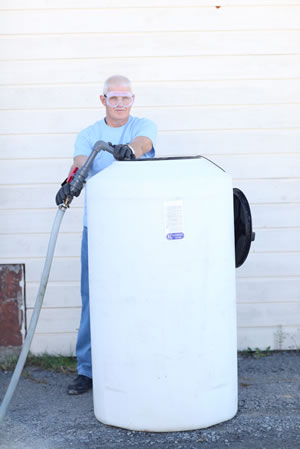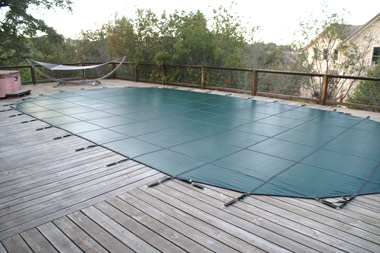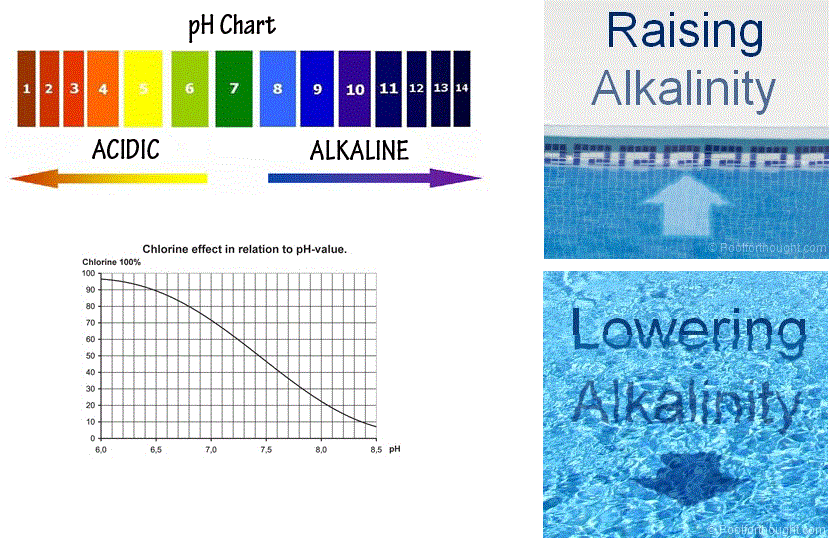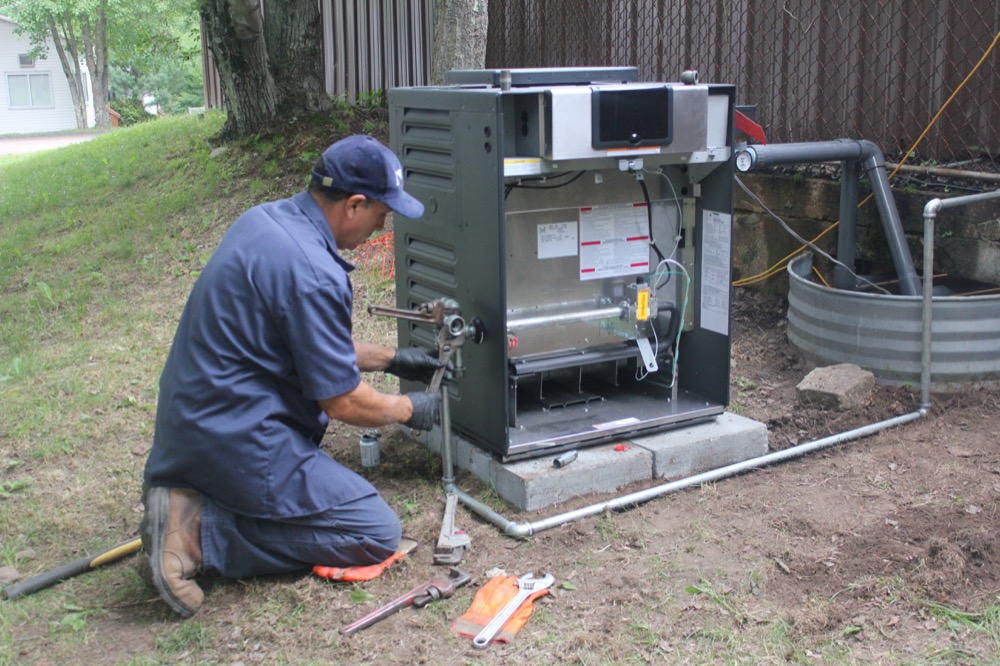Products
-
Liquid Chlorine - Sodium Hypochlorite

Liquid Chlorine
Most of our customers prefer shocking with liquid chlorine vs. granular chlorine shock. Here are some of the reasons-
Liquid Chlorine is:
- Cleaner: With liquid chlorine, there is no granular powder to settle on the bottom of your pool and cloud your pool water.
- Quicker: Liquid chlorine begins working instantly; granular chlorine shock must dissolve first.
- Non-Scaling: Over time, granular chlorine shock can lead to excessively high calcium or stabilizer levels, which can cause scaling or pool stains. Liquid chlorine does not cause these problems.
- Costs Less: Liquid chlorine is up to 60-80% less costly than granular chlorine shock, because the chlorine strength of 2.5 gallons of liquid chlorine would require 4-7 lbs. of granular chlorine shock.
-
LOOP-LOC Covers

LOOP-LOC Covers
What is the difference between a regular pool cover and a LOOP-LOC safety pool cover?
A typical solid vinyl pool cover is little more than a tarp to put over your pool. It does not prevent children or pets from gaining access to the pool. All safety covers must conform to the Standard Performance Specification set by the American Society for Testing and Materials (ASTM). According to the ASTM, a safety cover must be able to support a certain amount of weight, not permit gaps that a child or pet could squeeze through, and remove standing water. LOOP-LOC safety pool covers far exceed minimum ASTM standards. Built from extremely strong material and secured tightly to the deck by heavy-duty springs and brass anchors, a LOOP-LOC safety cover puts a “lock” on a pool that will prevent children and pets from gaining access to the water.
Schedule an appointment to have one of our service techs come and measure your pool for one of the incredible safety covers.
-
pH Control - Soda Ash

pH Control
Having a good swimming pool pH level is essential in making sure that all of the equipment and chemicals used in your pool are doing their job correctly. That’s why it’s so important to test the levels at least once a week. Even in the off-season you’ll want to keep an eye on it, because as an open water system, you’ll have nasty algae growth, fungus, bacteria and the like.
For commercial swimming pools, you have a better option for pH control than using dangerous Muriatic acid to control your levels. Carbon Dioxide (CO2) has been used for years throughout the industry. Tri-State Carbonation Service, Wechsler’s sister company, can install a bulk system and the automated controllers to keep your pool sparkling clean and sanitized. Visit TCSCO2’s website for more details.
It’s not uncommon for your pool pH level to raise or fall depending on a number of situations. What is important is to know exactly what steps to take in order to get it back into optimal range depending on if it’s too high or too low.
Swimming pool pH is a measurement of acid to alkaline ratio. At 7.0, your pool water is perfectly neutral, above that number and it becomes alkaline, while below it means your pool is too acidic. The most desirable range we’d like to keep our pool pH level at is between 7.2 and 7.6. It’s in this range that our equipment and chemicals can function to the best of their ability.
WHAT TO DO IF PH IS TOO HIGH:
In general, pH will have a tendency to raise. This is because of human waste such as sweat. So in this instance we’ll want to take a few simple steps to get it back to normal.
Firstly, you’ll need to purchase an acid designed to be used in swimming pools. The most common forms of these acids are dry acid and muriatic acid.
Next, we’ll start by making sure our pool pump is on. Then at the deep end of the water we’ll start slowly adding in whichever form of acid you decided to go with. Be sure to pay attention to the label as it will give you instructions on how much acid per treatment depending on the size of your pool, and how much water there is.
This will be an on going process. Adding acid bits at a time, and leaving the pool for some time, then rechecking your levels. Repeat until the pH level is back in optimum range.
WHAT TO DO IF PH IS TOO LOW
Basically you’ll be doing the same steps as above, however, instead of using an acid we’ll be using an alkaline such as soda ash. Again, keep the pool pump on and add bits at a time letting the alkaline circulate while still testing the waters until the pH is back in optimum range.
Swimming pool pH level problems come about because of poor pool maintenance. However, that doesn’t mean that you’re doing a bad job. In a lot of cases most people are given bad advice as to how best to maintain their pools in order to be sold more chemicals and equipment that is generally unnecessary.
WHAT TO DO IF ALKALINITY IS TOO HIGH
Your pH could drift to an extremely high level very easily. If this happens, it can be difficult and slow to get it back down to normal. If the alkalinity is too high, you could see signs of scaling and very cloudy water. If this should happen, you could bring your alkalinity down with pH decreaser. pH down is used to lower the alkalinity as well as the pH in your pool water.
WHAT TO DO IF ALKALINITY IS TOO LOW
It will be very hard to control the pH. You will probably find that the pH measurement is bouncing all over the place. Low alkalinity can be very corrosive, eating away at pool surfaces as well as the pool equipment. If the alkalinity is too low, you will need to add Alkalinity Increaser. This is often referred to as Alkalinity Plus or Alkalinity Up. Once you have the alkalinity adjusted, you then adjust the pH.
If you find that you are having problems keeping your pH and Alkalinity balanced, there is a product that will help you tremendously. It is called Ahh-Some. It has a funny name, but it is a wonderful product that seems to lock pH and Alkalinity in place.Taking care of your swimming pool is extremely important. You want to make sure your water is balanced so that your pool and equipment are safe. More than that, you want to be sure that the water your family is swimming in is safe.
Visit our Retail Store for the pH Control products needed for your pool.
-
Pool Heaters

Pool Heaters
After investing the money that you have in a pool, it makes send that you want to get as much use as possible out of it.
By installing a pool heater, you can not only extend the length of time each day that you use your pool, but you can actually extend the length of the swimming season.
Wechsler has been heating swimming pools of all sizes for decades with service backing every sale to make sure you get the most for your pool heater.
Wechsler Pool Supply is a Hayward & Raypak pool heater dealer and factory authorized repair service center.
-
Retail Store

Retail Store
The retail store has a full line of Taylor test kits and reagents, required pool safety equipment, chlorinators and residential pool pumps. We have replacement parts for most Hayward pumps and carry a variety of chemicals to help keep you pool clean & clear. We are also a Bioguard dealer and carry their pool and spa products.
CALL TODAY TO SCHEDULE YOUR POOL OPENING/CLOSING – SLOTS ARE FILLING FAST
-
SDS
Below please find our most commonly used chemical safety data sheets. Click the links below to download the PDF.
1-866-444-POOL
845-794-9600
CALL TODAY TO SCHEDULE YOUR POOL OPENING SLOTS ARE FILLING FAST
Wechsler Pool Supply is a Hayward & Raypak Pool Heater Dealer & Factory Authorized Repair Service Center